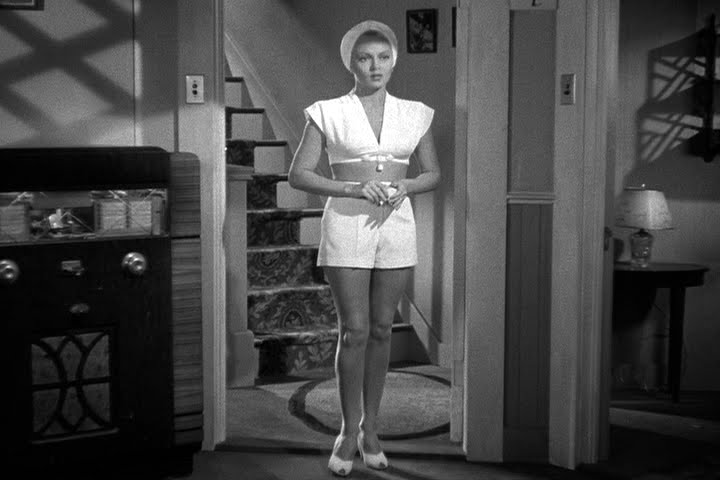(This is the sixth entry in the The Modern Library Reading Challenge, an ambitious project to read the entire Modern Library from #100 to #1. Previous entry: Sophie’s Choice)
The movement away from theory and generality is the movement toward truth. All theorizing is a fight. We must be ruled by the situation itself, and this is unutterably particular. Indeed it is something to which we can never get close enough, however hard we may try as it were to crawl under the net.
 The above sentiment comes from Annandine, a character in a manuscript entitled The Silencer, modeled upon some philosophical chatter between a frustrated translator named Jake Donoghue and an industrialist/sophist named Hugo Belfounder, which is contained within Iris Murdoch’s debut novel, Under the Net. And if all that makes the book sound like a matryoshka doll with endless porcelain layers that need to be opened if the reader has any hope of unraveling the truth (to some degree, it is), then I should also note that Under the Net is also a sprightly picaresque novel. There are dogs, fireworks, giant Roman film sets occupied by socialists, martinets working at hospitals, experimental theatrical performances, and mad searches for people in pubs.
The above sentiment comes from Annandine, a character in a manuscript entitled The Silencer, modeled upon some philosophical chatter between a frustrated translator named Jake Donoghue and an industrialist/sophist named Hugo Belfounder, which is contained within Iris Murdoch’s debut novel, Under the Net. And if all that makes the book sound like a matryoshka doll with endless porcelain layers that need to be opened if the reader has any hope of unraveling the truth (to some degree, it is), then I should also note that Under the Net is also a sprightly picaresque novel. There are dogs, fireworks, giant Roman film sets occupied by socialists, martinets working at hospitals, experimental theatrical performances, and mad searches for people in pubs.
The Complete Review‘s Michael Orthofer called these affairs “a bit too manic” and accused Murdoch’s protagonist of living a life that was “a bit too unsettled.” The latter charge is certainly true. Jake Donoghue does indeed hop from domicile to domicile, often at the behest of a generous woman, seeking rent-free space to sleep and frequently checking his possessions in with a newspaper vendor named Mrs. Tinckham (a working-class Lady Metroland?). But I think the good Mr. Orthofer’s being a bit unfair. The book’s bountiful gallivanting reminded me of similar evenings I’ve had. I may not have plunged fully clothed and drunken into the Thames (although I have thrown my unclothed and inebriated form into the San Francisco Bay), but I have climbed through windows, crashed parties, and found myself locked in rooms. I suppose verisimilitude depends upon the circumstances you invite into your life. For my own part, I have been liberal-minded.
As many know, Murdoch was an Oxford-trained philosopher and a leftist (at one point, a member of the Communist Party, as was de rigueur among the Oxford set), leaving one pondering the real-life origin of the above-cited philosophy. The snippet may have emerged from something Murdoch overheard from two students. Or perhaps it didn’t have any existential origin point at all. At the end of Under the Net, after many journeys in London and Paris, Jake is presented with an observational puzzle. “I don’t know why it is,” he responds. “It’s just one of the wonders of the world.”
This tidy finale suggests that the philosophy presented in this novel is very much about the journey rather than the destination. The “original” Jake/Hugo conversation, which concerns the lofty topic of whether or not language is capable of expressing our true feelings, demonstrates the inherent emotion within the proposition. “There’s something fishy about describing people’s feelings,” says Hugo, who swims in these choppy waters to expound his theory that all statements are falsified from the start. Say that you’re “apprehensive” after the fact, Hugo says, and it doesn’t cut the mustard. That these words are exchanged in an experimental clinic, where both men are sick, says it all.
If language can’t capture every mite of emotional complexity, then the completed volumes contained within Murdoch’s volume matter very much to her effervescent characters. Jake’s translation of a novel becomes an unanticipated instrument of coercion. The Silencer, Jake’s effort at writing a novel (“treated to a few lukewarm reviews”), is also responsible for much of the lack of communication between characters. Because Jake has modeled his novel on his conversation with Hugo, he is reticent to reestablish ties — until, of course, he discovers Hugo’s involvement with a pair of sisters he knows. And even then, he has “really very little idea about what I wanted to say to Hugo.” It is only when Hugo is ensnared in a hospital that Jake can at long last use language to patch things up. But Hugo claims that, despite his singular philosophy from the past, he cannot remember what he talked with Jake about. Later still, Jake locates Hugo’s copy of The Silencer (Murdoch’s novel contains a remarkable amout of breaking and entering), and discovers that Hugo has “underlined passages, put crosses and question-marks in the margin; and at one place there was a penciled note, Ask J.” Is Hugo being coy? Or does he genuinely not remember? And if it’s the latter, where does the point of translation begin?
Why not seek such answers in the protagonist himself? Jake’s main employment comes from translating a hack French novelist named Jean Pierre Breteuli, author of such books as This Wooden Nightingale. But later in the book, Jake discovers that Jean Pierre’s latest volume (which Jake hasn’t yet translated) has won the Prix Goncourt. This merit is enough to confuse poor Jake, who has spent much of his time viewing Jean Pierre’s work (and thus his own labor) with derision:
I had classed Jean Pierre once and for all. That he should secretly have been changing his spots, secretly ennobling his thought, purifying his emotions: all this was really too bad. In my imagination I was already lending the book every possible virtue, and the more I did so the more I felt a mingled rage and distress which drove every other idea from my mind.
Murdoch plays Jake Donoghue in the first person. And it seems prudent to bring this up, given that the two Quentin sisters he encounters are both involved in performance. The younger, Sadie, is a film star, a seeming ingenue who Jake dismisses as childish (despite hanging out with men who enjoy being childish), but who proves more cunning. She asks Jake to take care of her flat, but she locks him in. Still looking for a place to live, Jake meets the older sister, Anna Quentin, who is a former singer six years older than Jake, a past fling, and now something of an experimental theater queen (literally crowned by Jake). Anna’s also as old as Murdoch was when she wrote Under the Net. Jake attempts to reintroduce himself into Anna’s life through a quite eccentric method:
At that time too I had, in a not entirely disinterested fashion, been teaching Anna some Judo, and one of our customs had been that when I came in I would seize her and throw her down into this corner to be kissed. The memory of this rose in me now like an inspiration and I advanced upon her. I took her wrist, and for an instant her eyes wide with alarm, very close to mine, and then in a moment I had thrown her, very carefully, on to a pile of velvet costumes in the corner of the room.
If Anna can be likened to Murdoch, might it be possible to construe this as a character pouncing upon its creator? That’s probably a stretch. Still, Jake has his custom, just as sufficiently transferred through years of singular permutations as The Silence, and it is feeling which causes this physicality. If it so astonishing through physical action, then is it not possible that such fancies are just as astonishing through the linguistic? Jake’s competing with fragments of all types. When Anna eventually leaves, Jake is locked up in the theater and must spend the night in a room amongst a good deal of bric-a-brac. When Jake catches sight of Anna later in Paris, he cannot catch up with her. He is reduced to plucking her shoes from the grass.
Jake is certainly a young man with fussy peculiarities (“I hate entering a crowded room and feeling a whole gallery of faces focused upon me,” “I find that sea voyages promote reflection”), yet one who impulsively declares that he’s a socialist when confronted by a political figure named Lefty Todd. What do politics mean in this book? More of a dog-and-pony show (with a film set subbing in for the pony) than anything else. There is an effort at a political conversation between Lefty and Jake. Jake makes an appointment to continue it, but he never does. If philosophy is something that is transmuted over iterations, then politics resembles more of an endless cycle.
Under the Net is dedicated to Raymond Queneau, and this French comic novelist proved to be such an influence that Murdoch would later cop to copying him as much as she could. One sees Queneau’s Pierrot Mon Ami as one of two novels that Jake leaves behind when he must flee his rent-free home at the beginning. The other book Jake abandons is Samuel Beckett’s Murphy. Despite Murdoch’s dedication, it is with Beckett that the imitative influences are more readily identified. Jake has distant kin named Finn, often confused as a servant, and this is very close to the relationship between Neary and “his âme damnée and man-of-all-work, Cooper” in Murphy. Neary’s pursuit of Miss Counihan might be likened to Hugo Belfounder’s pursuit of Sadie in Under the Net. Where Murphy suffers from heart attacks (although that’s nothing compared to Neary’s ability to stop his heart), Jake suffers from shattered nerves. However, in a possible deference to Neary’s sputtering palpitations, Murdoch does have Jake’s heart “beating out the refrain too late” when locating a taxi. More obviously, in both books, a hospital figures prominently.
In a 1968 interview with WK Rose, Murdoch was to call Murphy “a kind of ancestor to Under the Net.” And in John Bayley’s book, Elegy for Iris, Murdoch’s husband revealed that Murdoch learned about Murphy directly from Queneau himself when the two writers hung out in various Brussels cafes. Jake Donoghue’s account, expurgated, accelerated, improved and reduced, gives off undeniable similarities, yet both books are sui generis.
In assessing Under the Net later in life, Murdoch was to write, “I can see very clearly how bad it is. It is very romantic and sentimental, even what is intellectual in it is intellectual in a romantic way. If anything saves it from complete wreck it is a sort of vitality and joy that lifts it a little.”
But it is this very sentimentality that not only makes the novel so much fun, but that permits Murdoch to use conceptual philosophy as ironic comedy. Aside from the funny methods in which the Quentin sisters lock Jake up, Jake’s cosmic fate serves as a comical counterpoint. He can only be kicked out of a domicile or locked into one. (These incarcerations are interesting involutions of Beckett’s Murphy, considering that Wylie is locked out of his room and our introduction to Murphy sees the layabout tied up by choice in a rocking chair. There is no rocking chair in Under the Net, but there is a rocking horse with “big vacant eyes.” This is undoubtedly a nod to the opthalmically obsessed Beckett, as well as DH Lawrence’s “The Rocking-Horse Winner.” (Indeed, there are many winners at the racetracks in this novel.) Murdoch, to her sly credit, provides no homage to chess.
There is also the matter of Mister Mars, a stunt dog owned by the Bounty Belfounder Studio who is encountered by Hugo while locked in a cage. Mister Mars doesn’t quite serve as a Schrodinger-like answer to the Cartesian logic within Murphy, although at one point he does play dead so that Jake can escape an imbroglio. Over the course of the book, the dog is both young and old, worth nothing and worth quite a bit, quiet and boisterous. Yet the many parties feel the need to appraise him. “Sorry to be a business girl,” reads the final message concerning Mister Mars, “but one has to watch the cash, with the cost of living and partly living what it is.” “Partly living” is the key phrase here. Perhaps the young Murdoch, the progressive-minded humanist who eventually liberated herself from the Communist Party yoke (becoming a very hard Thatcherite in later years), was trying to determine if the novel offered a reconciliation point between accurately representing life and some concession to narrative that involved “partly living.” Under the Net succeeds because it is both a series of adventures (akin to The Ginger Man) and reflective of a young person’s intellectual journey. And what better metaphors are locked rooms or diminishing paramours for the divagating and theoretical manner in which we seize every possible scrap and hang on to every possible word?
[UPDATE: I had no idea that another Iris Murdoch biography had been published, but Martin Rubin’s review in the Wall Street Journal (published the day after my essay) sheds some additional light on the connections between Murdoch’s early life and her early novels. Was Jake Donoghue inspired by Frank Thompson? And if Murdoch recruited Thompson to the Communist Party, is it possibly that Lefty’s laughably smooth coercion of Jake in Under the Net is based on this exchange?]


 In Alexandra Styron’s forthcoming book, Reading My Father, she describes liberating a galley of Sophie’s Choice, a presale unit freshly arrived at the family home, at the age of twelve. It was the spring of 1979. Her plan was to read the mint green paperback between classes. She felt it incumbent “to somehow validate the rumors of his greatness.” Young Alexandra discovers that the novel bores the tears out of her. “The difficult vocabulary and historical references kept eluding me,” she writes, “until finally I began to let them sail by, unchallenged.” Further, upon encountering her father’s libidinous passages, she then becomes embarrassed, wincing “at the liberal sprinkling of words like fucking and horny and lust.” (Here’s the full tally according to Amazon’s Look Inside! feature: “fucking” — 29 counts; “horny” — 4 counts; and “lust” — 20 counts. I am also informed that readers in need of steady doses of the mildly profane are likely to find a good deal more “fuck” and “fucking” in Philip Roth’s Zuckerman books. Miles Davis’s autobiography, published a decade after Sophie’s Choice, contains 672 uses of the word “fuck.” I think it’s safe to say that Styron was pushing the “fucking” boundaries no more and no less than any other writer around the time. Perhaps his striking tone says something about his ability to alarm.)
In Alexandra Styron’s forthcoming book, Reading My Father, she describes liberating a galley of Sophie’s Choice, a presale unit freshly arrived at the family home, at the age of twelve. It was the spring of 1979. Her plan was to read the mint green paperback between classes. She felt it incumbent “to somehow validate the rumors of his greatness.” Young Alexandra discovers that the novel bores the tears out of her. “The difficult vocabulary and historical references kept eluding me,” she writes, “until finally I began to let them sail by, unchallenged.” Further, upon encountering her father’s libidinous passages, she then becomes embarrassed, wincing “at the liberal sprinkling of words like fucking and horny and lust.” (Here’s the full tally according to Amazon’s Look Inside! feature: “fucking” — 29 counts; “horny” — 4 counts; and “lust” — 20 counts. I am also informed that readers in need of steady doses of the mildly profane are likely to find a good deal more “fuck” and “fucking” in Philip Roth’s Zuckerman books. Miles Davis’s autobiography, published a decade after Sophie’s Choice, contains 672 uses of the word “fuck.” I think it’s safe to say that Styron was pushing the “fucking” boundaries no more and no less than any other writer around the time. Perhaps his striking tone says something about his ability to alarm.)
 When I first discovered the names Kit, Port, and Tunner, my mind instantly concluded that these must be debauched head honchos for some baleful corporate defense firm. This was then followed by a few inescapable jokes that I delivered to walls of books when nobody was around: Tunner getting Kit’s kit off, Port in a storm, and so forth. I am sad to report that the tomes offered no laughs or kind titters in return. Neither, for that matter, did my copy of The Sheltering Sky: a grim and largely humorless volume that did an impressive job filling about six hours of my life with a stupendous sense of dread. (I feel dreadful just remembering the experience of reading this book, even though I simultaneously recognize the book’s virtues and now see just how much Dan Simmons was channeling Bowles with his excellent debut novel, Song of Kali.)
When I first discovered the names Kit, Port, and Tunner, my mind instantly concluded that these must be debauched head honchos for some baleful corporate defense firm. This was then followed by a few inescapable jokes that I delivered to walls of books when nobody was around: Tunner getting Kit’s kit off, Port in a storm, and so forth. I am sad to report that the tomes offered no laughs or kind titters in return. Neither, for that matter, did my copy of The Sheltering Sky: a grim and largely humorless volume that did an impressive job filling about six hours of my life with a stupendous sense of dread. (I feel dreadful just remembering the experience of reading this book, even though I simultaneously recognize the book’s virtues and now see just how much Dan Simmons was channeling Bowles with his excellent debut novel, Song of Kali.) 
 When I was a shy stripling new to San Francisco, there were three writers who showed me the way to manhood: James Baldwin, Henry Miller, and James M. Cain. Baldwin was angry for being the other, but with very good reason. Miller was playful (and often indignant) for being the other, but his “other” was narrow and individual. Not a cult of one, but not the kind of guy to easily integrate into a Western Union desk job. Hence, the writing life. Hence, poverty. Bless both gentlemen for their eccentricities. I’m not being hyperbolic when I state that I couldn’t have survived my early twenties without them. And bless the Modern Library for including both of these writers on its list. I look forward to revisiting them.
When I was a shy stripling new to San Francisco, there were three writers who showed me the way to manhood: James Baldwin, Henry Miller, and James M. Cain. Baldwin was angry for being the other, but with very good reason. Miller was playful (and often indignant) for being the other, but his “other” was narrow and individual. Not a cult of one, but not the kind of guy to easily integrate into a Western Union desk job. Hence, the writing life. Hence, poverty. Bless both gentlemen for their eccentricities. I’m not being hyperbolic when I state that I couldn’t have survived my early twenties without them. And bless the Modern Library for including both of these writers on its list. I look forward to revisiting them.
 I feel morally obliged to point out that I am hardly the only person attempting to read all of the Modern Library titles. When I first considered this project, I was completely unaware of
I feel morally obliged to point out that I am hardly the only person attempting to read all of the Modern Library titles. When I first considered this project, I was completely unaware of